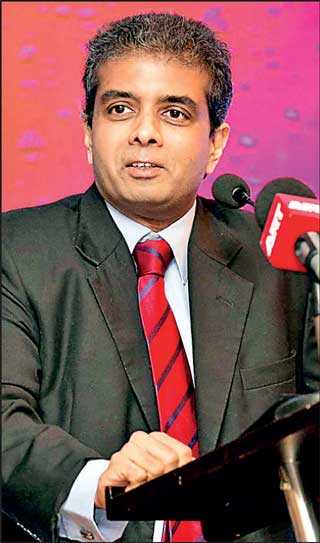Tuesday Feb 24, 2026
Tuesday Feb 24, 2026
Friday, 26 June 2020 00:00 - - {{hitsCtrl.values.hits}}
Achieving an accelerated COVID-19 economic recovery will require Sri Lanka to double down on domestic production, narrow the trade deficit, strengthen fiscal and monetary discipline, improve competitiveness, global market access and maintain macro stability, Ceylon Chamber of Commerce (CCC) Chairman Dr. Hans Wijayasuriya said yesterday.
 |
Dr. Hans Wijayasuriya |
Speaking at the Annual General Meeting (AGM) of the CCC, he pointed out the fundamentals outlined by him mirror the principal policy proposals featured in the Sri Lanka Economic Acceleration Framework published by the Ceylon Chamber in September last year. He also emphasised the Chamber is confident that the private sector will continue to transform ahead of the curve and thereby form a “cornerstone of the nation’s economic revival.”
“The Sri Lanka Economic Acceleration Framework, or SEAF for short, was developed by a large team of experts drawn from across the multiple sectors of Sri Lanka’s economy and addressed the challenge of re-calibrating Sri Lanka’s economic trajectory, targeting a rapid escape from the middle-income trap,” he said.
The SEAF envisioned and put forth an action plan for the elevation of Sri Lanka’s $ 89 billion economy (in 2018), to a $ 134 billion economy by 2025.
Dr. Wijayasuriya noted the COVID-19 crisis has forced a reset on the economic ambitions set out in the SEAF. He stressed that the structural proposals espoused in the SEAF remain valid and have been given an elevated importance given the challenges of a post COVID-19 economic revival.
“Therefore, and not withstanding post COVID-19 imperatives, we look forward to a recommitment of Government focus towards the recalibration of public sector expenditure, the empowerment and up-skilling of the civil service, a concerted effort towards SoE reform and Public Private Partnerships as modalities of capital mobilisation.”
It is also fundamental that balanced sectoral growth and strengthening of growth enablers encompassing digitisation, health, education, food security and energy sufficiency should be shared priorities of the Private and Public Sectors.
“While we collectively aim for an accelerated revival of Sri Lanka’s economy, it is now crucial that a second wave of the disease is prevented at all cost. As segments of the external sector are successively activated, and movement restrictions relaxed, it is crucial that both the private and public sectors apply singular focus to compliance with the stipulated safety measures – a commitment which will need to be supported by requisite caution and restraint,” he added.
The CCC Chairman called for the private sector to be seen as an equal partner in securing an accelerated economic recovery and should be equally called upon to transform, to meet the challenges of the new normal. “Sri Lanka’s private sector was quick in embarking on transformation, commencing with employment retention initiatives centred on the adjustment of production and service portfolios to meet adjacent demand, alongside the retraining and redeployment of human capital. Equal focus was directed at re-engineering Supply and Value chains with primacy for domestic supply eco-systems and the sustenance of SMEs.”
He went onto say the private sector has also actively supported the Government with respect to pooling of logistics and fulfilment capacities, and mitigating Sri Lanka’s Foreign Exchange Liquidity challenges via restructuring foreign supplier credit terms. Focus has also been applied to the digital transformation of operations including interfaces to suppliers, partners and domestic and global customers.